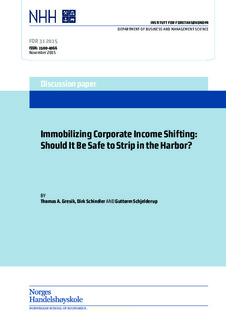Immobilizing Corporate Income Shifting: Should It Be Safe to Strip in the Harbor?
| dc.contributor.author | Gresik, Thomas A. | |
| dc.contributor.author | Schindler, Dirk | |
| dc.contributor.author | Schjelderup, Guttorm | |
| dc.date.accessioned | 2015-11-18T10:44:14Z | |
| dc.date.available | 2015-11-18T10:44:14Z | |
| dc.date.issued | 2015-11-18 | |
| dc.identifier.issn | 1500-4066 | |
| dc.identifier.uri | http://hdl.handle.net/11250/2364462 | |
| dc.description.abstract | Many subsidiaries can deduct interest payments on internal debt from their taxable income. By issuing internal debt from a tax haven, multinationals can shift income out of host countries through the interest rates they charge and the amount of internal debt they issue. We show that, from a welfare perspective, thin-capitalization rules that restrict the amount of debt for which interest is tax deductible (safe harbor rules) are inferior to rules that limit the ratio of debt interest to pre-tax earnings (earnings stripping rules), even if a safe harbor rule is used in conjunction with an earnings stripping rule. | nb_NO |
| dc.language.iso | eng | nb_NO |
| dc.publisher | FOR | nb_NO |
| dc.relation.ispartofseries | Discussion paper;31/15 | |
| dc.subject | Multinational | nb_NO |
| dc.subject | Income-shifting | nb_NO |
| dc.subject | safe harbor | nb_NO |
| dc.subject | earnings stripping | nb_NO |
| dc.title | Immobilizing Corporate Income Shifting: Should It Be Safe to Strip in the Harbor? | nb_NO |
| dc.type | Working paper | nb_NO |
| dc.source.pagenumber | 36 | nb_NO |
Files in this item
This item appears in the following Collection(s)
-
Discussion papers (FOR) [564]
